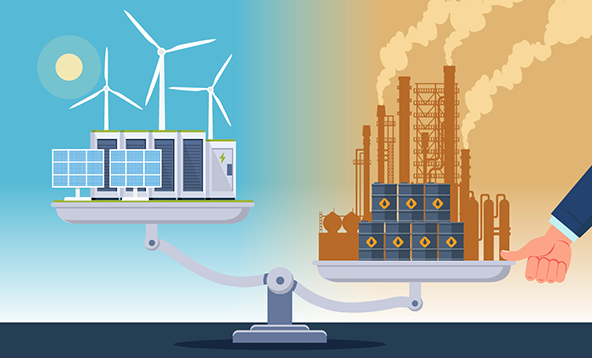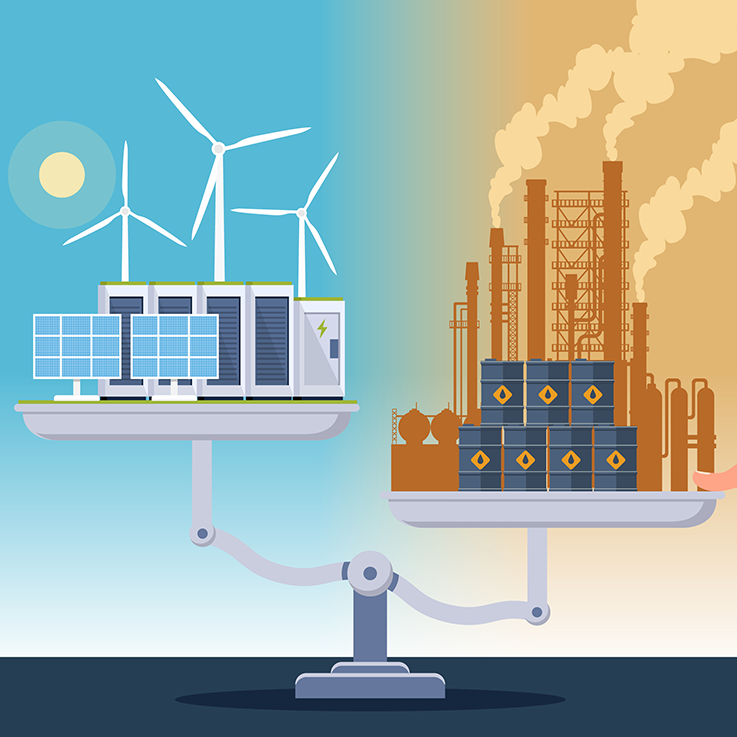
(Illustration by Formative)
The Trump administration is advancing an extreme, genuinely catastrophic energy policy that requires the strongest possible counter-offensive from climate advocates and funders. As our climate deadlines bear down on us, it is past time to come together around a broadly aligned and robustly resourced strategy, both to promote rapid clean energy deployment and limit the massive oil and gas expansion now underway. Crucially, the organizing and place-based work that is needed to stop irreversible fossil fuel entrenchment is also work that is needed to create the political conditions for ambitious climate action within a functioning democracy.
In these last-chance years to shift our climate trajectory from catastrophic to livable, the United States is producing more crude oil than any country ever has. In 2024, the United States was also the world’s biggest gas producer. The ascendancy of oil and gas interests is a defining fact of American life—economically, politically, and culturally. This was true during the Biden administration, which presided over an oil and gas boom notwithstanding historic climate ambition and accomplishments. It is unmistakably true now, as the second Trump administration pursues a crystal clear agenda to crush clean energy and enshrine oil and gas dependence.

The Impact of Oil and Gas on American Life
![]() FOLLOW THIS SERIES
FOLLOW THIS SERIES
The scale and urgency of the current threat should settle a long-simmering debate about the strategic value of targeting oil and gas production directly. There is no inherent tension between efforts to limit fossil fuel production and efforts to boost clean alternatives, and many advocates understand them both to be necessary and intertwined. But there is also a competing and philanthropically consequential view that the only effective way to overcome the outsize power of the fossil fuels industry is to invest in solutions-side advocacy. Given the scale of new oil and gas development that is slated for lock-in domestically and also globally, it is not enough to focus on limiting demand for fossil fuels. The imperatives over the next three years are to block further oil and gas expansion, drive clean energy progress, protect our bedrock environmental laws, and to use every fight to build a stronger, more activated base of support for energy transition.
Limiting Oil and Gas Expansion
The climate imperative to stop oil and gas expansion is clear. As the Intergovernmental Panel of Climate Change (IPCC) has consistently affirmed, greenhouse gas emissions from existing fossil fuel infrastructure are already on track to drive temperature rise greater than 1.5 degrees Celsius. New oil and gas development is taking us further off the narrow pathway to climate stability, perhaps irretrievably.
Ceding the clean energy economy and redoubling investment in oil and gas is the wrong path forward, especially given that current oil and gas production is more than sufficient to meet near term needs both domestically and geopolitically. Deferring the necessary energy transition in the United States will only increase its cost while foregoing the immediate economic benefits of new clean energy investment and jobs. The same logic applies globally. US export strategy—and especially tariff negotiations that lock in uptake of US oil and gas—will make energy transition slower and more expensive for other countries too.
Nevertheless, the United States is on a building spree as well as a tariff offensive. This year and next, oil and gas production is expected to begin at 13 new “fields” in the Gulf of Mexico. As of July 2025, there were seven new liquefied natural gas (LNG) export terminals under construction, 11 more terminals approved, and four terminals either proposed or in the pre-filing stage of the permitting process. As of June 2025, 18.7 gigawatts of new gas capacity were slated to come online by 2028, with 4.3 GW already under construction.
Beyond the climate implications, these big new projects are increasing toxic health burdens on people who have to live near them, especially in the Gulf South and Appalachia, which are targeted for the most deadly pollution and the least economic benefit. Existing rates of premature death, cancer, asthma, and other disease in oil and gas hubs should be compelling
a swift transition to cleaner alternatives. Instead, the Trump Environmental Protection Agency (EPA) is working to eliminate pollution control requirements and other health protections so that it can further accelerate oil and gas development.
Similarly, the Trump Interior Department is advancing an extreme iteration of “drill-baby-drill” policy to open up public lands and coastal waters to drilling and fast-track new infrastructure projects under the pretext of a false “energy emergency.” The One Big Beautiful Bill Act (OBBBA) turbo-charged these efforts with the most sweeping public lands giveaway in modern history. Among other things, it mandates 30 offshore lease sales of 80 million acres each in the Gulf of Mexico and quarterly oil and gas lease sales for onshore public lands across more than 200 million acres in the West.
In short, the Trump administration is poised to lock in oil and gas dependence—generationally. And its attacks on environmental laws and regulations and the agencies charged with environmental protection are, to a remarkable degree, designed to advance fossil interests. But it is possible to stop harmful projects and redirect national trends, even when it requires facing off against powerful corporations backed by the White House. For example, under the first George W. Bush administration, Vice President Cheney convened an energy task force that proposed construction of 200 new coal plants to address a purported energy emergency. That was a prescription for runaway climate change, but advocates successfully harnessed organizing and litigation to block 170 of those plants. Similarly, during the first Trump administration, over 300 new petrochemical plants were proposed, predominantly in the Gulf South and Appalachia. Concerted local opposition, supported by organizing, lawsuits, and sharp communications strategies have so far succeeded in blocking much of that build-out.
Fundamental goods such as clean air and water do not simply exist. They are the product of ongoing and vigilant enforcement of strong legal standards and requirements.
New fossil fuels development on the scale contemplated by the Trump administration will harm and antagonize millions of people—including people who are already living with unconscionable cancer risks from fossil fuels pollution, people who are weathering devastating climate shocks, people who treasure our public lands, people who are ready to fight to keep their air and water clean. To harness that opposition and derail a coming onslaught of lawless federal actions, philanthropy needs to support (1) organizations that have community standing and influence to lead local opposition; (2) organizations that can provide excellent support, including applied scientific and economic analysis and legal representation; and (3) coalition and campaigning infrastructure that accelerates learning across communities and aggregates their collective power for political impact. Leaders across the country are already doing this work, but their capacity is constantly overstretched. Without more support, it will be overwhelmed.
Driving Faster Deployment of Clean Energy
Of course, it will not be sufficient to stop new oil and gas projects. Swift energy transition depends on scaling up affordable clean energy. With the loss of IRA incentives and escalating attacks on wind and solar energy, it will take a much bigger push to deploy clean energy fast enough.
In the OBBBA, Congress abandoned any pretense of resource-neutral energy policy and picked winners (oil and gas) and losers (wind and solar), eliminating or rapidly phasing out nearly all federal investments that were instrumental in scaling wind and solar even before the Biden administration. Meanwhile, the Trump administration is waging an all-out offensive on renewables, holding up permits, blocking new wind developments, and directing the Justice Department to attack state climate initiatives, including the essential policies that advanced clean energy deployment during the first Trump administration.
This extraordinary hostility to clean energy demands a commensurate counter-offensive. Energy advocates and litigators need more support to handle a new volume of work with defining implications for energy regulation. As the Trump administration tries to brand clean energy as anti-American, more investment in organizing and communications work is required, especially in local venues, including city councils, zoning boards, and public utility commissions, where fossil fuel interests are successfully rallying local opposition based on disinformation—for example, that wind turbines and solar arrays cause cancer.
Crucially, the climate community must supercharge advocacy and litigation to avoid unnecessary investment in new gas capacity to meet growing energy demand. In theory, it is possible to abandon expensive new assets, but in real life it rarely happens. No matter what, building new billion-dollar gas-fired power plants will lock in higher electricity rates for decades to come, making it more economically painful and less politically saleable to modernize the grid.
As the current rush to build new gas plants illustrates, the work to advance clean energy must be integrated with work to limit oil and gas expansion. And, to achieve durable and transformative outcomes, a holistic energy strategy should be grounded in popular and practical plans for energy transition regionally and locally. Clean energy technologies are mature enough to make the next leaps in scale, and there are proven policies to catalyze their uptake. What we need now are better roadmaps for accomplishing the transition in keeping with logistical, social and economic imperatives and constraints that vary across the country. In states with fragile and failing economies that are fossil fuel dependent—West Virginia, Louisiana, Alaska for example—what is the practical path toward a new economy that increases health and wealth? In states like Texas and North Dakota with booming oil and gas plays, what is the economic engine to ensure that energy transition will not leave people worse off? In a state like California that has invested heavily in clean energy, what is the best way to ensure access to affordable energy during the messy period when refineries are going off-line but people are still driving gas-fueled cars? Philanthropy can play a catalytic role in eliciting and enabling serious planning that grapples effectively with problems that will stall energy transition unless and until there are real, politically compelling solutions in sight.
Protecting Bedrock Environmental Laws and Regulations
In all the work ahead, litigation can and must play a role in stopping fossil fuels expansion and enabling timely energy transition. The sheer lawlessness of the Trump administration’s approach will give rise to cases that can prevail even in hostile courts and a legal landscape that has been disrupted by the Supreme Court. Win or lose, when lawsuits are premised on serious wrongs that our justice system should make right, they are powerful vehicles for raising the profile of issues and leaders, organizing effective opposition, and holding the government and powerful corporate actors publicly accountable. This is true of many kinds of cases including enforcement actions, challenges to government rulemaking and project permitting, and lawsuits to hold oil and gas companies financially liable—for example, the growing number of cases that municipalities are bringing against oil and gas companies for the damages caused by climate deception.
Because strong laws and regulations give rise to effective litigation strategies, the Trump administration is trying to eliminate them. Its target list includes regulations that address air and water pollution, waste disposal, chemical safety, ecosystem and species protection, and public lands stewardship. Republicans in Congress are pushing the same deregulatory agenda, while also trying to close the courthouse doors to public interest lawsuits. For example, the House and Senate energy committees are pushing for “pay to play” permitting provisions that would give developers the ability to pay for fast permits that would be immune from court challenges. To attract Democrats, they are framing efforts to gut statutes and preclude judicial review as “permitting reform”—a hot and divisive topic in the climate space.
There is certainly room to improve regulatory systems in the United States. We need to adequately staff and budget for faster environmental review. We should be scoping permitting processes to address the most salient issues of concern, not compiling hundreds of pages of analysis on immaterial issues. We can and should create pathways to streamline approvals for clean energy projects that confer essential environmental benefits. But the notion that we can do without environmental regulation is wrong. Fundamental goods such as clean air and water do not simply exist. They are the product of ongoing and vigilant enforcement of strong legal standards and requirements. Especially under the Trump administration, it would be disastrous to trade away bedrock environmental laws in hopes that deregulation will help us build clean energy infrastructure faster.
Deregulation will only benefit oil and gas incumbents that have no problem building things in the United States. Especially after passage of the OBBBA, clean energy is competing on a playing field that is tilted even further toward fossil fuels. In this political context, weakening environmental laws would not overcome the entrenched advantages enjoyed by the oil and gas industry. It would affirmatively advance the Trump administration’s fossil-first agenda and erode the competitive advantages that clean energy commands. To speed up clean energy deployment, we need tailored policies that are expressly designed to achieve that result. Gutting the laws that safeguard everyone’s right to a clean and healthy environment is not a pragmatic, second best solution.
Getting Organized
Demonizing regulation and climate advocacy is part of the Trump fossil-first agenda, and to a shocking extent, it is working. Nationally, Democrats are going quiet on climate change while climate disasters rock the country. Even in California, one of the world’s greatest laboratories for climate policy and action, there is a retrenchment in climate leadership.
It is not surprising to see climate resolve faltering as inconvenient deadlines for energy transition loom. No matter who is running the country, it will take enormous political will and logistical brilliance to transition the US economy away from oil and gas. The overwhelmingly powerful climate movement that could summon such political will is not yet here. But it could be. There are smart and talented leaders all around the country. Extreme weather is now personal for most people, whether they call it climate change or not. Clean energy transition can be an engine for new jobs and healthier communities. The conditions are ripe for organizing, but serious investment is required.
Now is the time to support communities to grapple in earnest with what it will really take, region by region, state by state, town by town, to manage a transition that leaves no one behind. Over the coming years, there will be many necessary fights to stop harmful oil and gas projects. Each one will present an opportunity to activate people around a practical vision for what we want instead. To maximize those opportunities, we need shared plans for the future and the relationships and resources to act on them together. As our current political moment makes clear, it is a daunting project to shift the common sense of a country that has centered the oil and gas industry for over 150 years—in our infrastructure, policy, and culture. But it is the project, and it will not get done without a very big fight.

The Funder Collaborative on Oil and Gas partners with Earthjustice and other environmental organizations working on litigation, regulatory defense, permitting, and local advocacy. To learn more or work with us, contact Sarah Brennan at [email protected].
Support SSIR’s coverage of cross-sector solutions to global challenges.
Help us further the reach of innovative ideas. Donate today.
Read more stories by Abigail Dillen.
